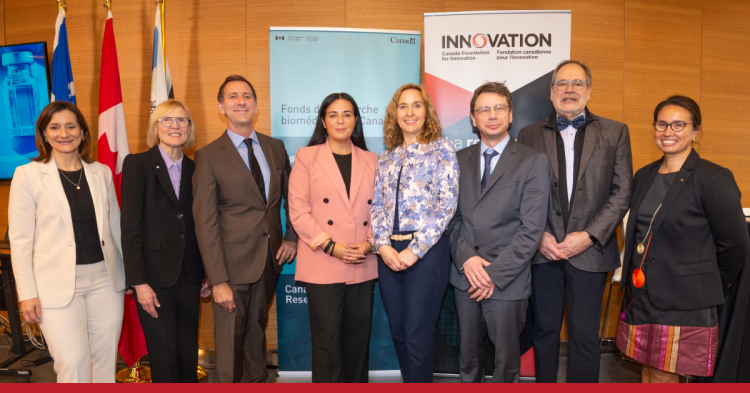Honourable Soraya Martinez Ferrada, minister of Tourism and minister responsible for the Economic Development Agency of Canada for the Regions of Quebec, attended an event at Polytechnique Montréal for the unveiling of the RAMP-UP biomanufacturing initiative, which is intended to support local production of vaccines and biologic drugs, as well as train the coming generations of specialists in this field.

The Honourable Soraya Martinez Ferrada, Minister of Tourism and Minister responsible for the Economic Development Agency of Canada for the Regions of Québec, and Gregory De Crescenzo, Full Professor, Department of Chemichal Engineering at Polytechnique Montréal. (Photo: Peter McCabe, The Canadian Press)
The COVID-19 crisis exposed a multitude of flaws in Canada's capacity to rapidly counter a pandemic outbreak. They include the scarcity of vaccine production infrastructure, but also a shortage of scientists with the skills to manage large-scale manufacturing of biopharmaceuticals.
By creating RAMP-UP, Gregory De Crescenzo, full professor in the Polytechnique Department of Chemical Engineering, hopes to help ensure that history does not repeat itself. The initiative received support in the amount of $20.5 million on May 6 from the Canada Biomedical Research Fund and Biosciences Research Infrastructure Fund, as part of investments totalling nearly $574 million in various projects across the country.
The project involves partners at Université de Montréal, Université Laval and the National Research Council Canada (NRCC) along with key players from the College Centres for Technology Transfer (CERASP, TransBioTech) and the biomanufacturing industry.
The group's objective is to set up a series of platforms to ensure rapid production of vaccines for clinical trials, after identification of a target protein. In addition to establishing cell lines for manufacturing of bioproducts, the group will develop scalable bioprocesses and the accompanying analytical protocols for controlling quality at every stage of production. Ultimately, RAMP-UP's mass-production capacity and expertise will enable it to reliably produce bioproducts formulated for Canadians.
"The projects that we're supporting today will strengthen our ability to supply medicines, vaccines and therapeutics for the benefit of Canadians," Mrs. Martinez Ferrada said in a news release issued in conjunction with the event. "These collaborations between research hubs, postsecondary institutions and research hospitals will foster innovation across the country. Thanks to the work of experienced scientists in institutions at the cutting edge of innovation, Canada will be ready to respond to future health priorities."
At the same time, RAMP-UP will help prepare the emerging generation of biomanufacturing specialists at all stages of biopharmaceutical research, from identification of targets to generation of cell lines, paying particular attention to scale-up of biopharmaceutical manufacturing processes. In doing so, it will rely in part on the Process Engineering of Emerging Nano-Medicines (PrEEmiuM) program, which is already enabling interns in the Montréal region to develop interdisciplinary and intersector collaboration skills, helping to counter the silo effect that has historically prevailed in the biopharmaceutical industry.
"Every link in the chain is important, and all the members' work is interrelated," Professor De Crescenzo explains. "Biochemists and cell biologists focus on the initial stages of identification, and then engineers oversee subsequent steps like scale-up to production and quality control."
RAMP-UP will also work closely with its partners to optimize technology transfer to the market, shortening the path from discovery to commercialization. The group will also benefit from specialized equipment procured thanks to $11.7 million in support from the Canada Foundation for Innovation (CFI), the Government of Québec, and the partners in a biomaterials development project, in addition to the $20.5 million in funding from the Canada Biomedical Research Fund and Biosciences Research Infrastructure Fund.
Priority: proteins
In recent decades, the biopharmaceutical industry has accelerated development of novel therapeutic agents that use cells as manufacturing facilities. Instead of scientists synthesizing small molecules via chemical reactions, cells do the job of making peptides, proteins or viral particles that can act as drugs or, in the case of vaccines, induce an immune response.
This method of producing medicines, however, is not without its grey areas. Besides maintaining uniform temperatures in the bioreactors, scientists must control pH, the agitation speed of the cells in culture, and the supply of oxygen and nutrients, among many other variables.
"We're working with living materials, and each time we need to determine the optimum cell culture conditions," Professor De Crescenzo says. "We're seeking to optimize not only the cells' productivity, but also the functionality and stability of the proteins they produce. It's quite the jigsaw puzzle."
Added to these challenges is that of scaling up to enable mass production. "In many cases, we can't simply apply proportionality to adjust each parameter to a larger culture volume, and this is where the work of engineers is especially valuable," adds Gregory De Crescenzo. "Our challenge is to determine the ideal conditions and ensure they remain as consistent as possible, regardless of the scale of production."

Left to right: Maud Cohen, President, Polytechnique Montréal; Roseann O'Reilly Runte, President and CEO, Canadian Foundation for Innovation; Gregory De Crescenzo, Full Professor, Department of Chemichal Engineering, Polytechnique Montréal; The Honourable Soraya Martinez Ferrada, Minister of Tourism and Minister responsible for the Economic Development Agency of Canada for the Regions of Québec; Valérie Laflamme, Associate Vice-President, Tri-agency Institutional Programs Secretariat (TIPS); Jérôme Estaquier, Full Professor, Faculty of Medecine, Université Laval; Yves Joanette, Deputy Vice-Rector, Research, Université de Montréal; Caroline Quach, Full Professor, Faculty of Medecine, Université de Montréal. (Photo: Peter McCabe, The Canadian Press)
Learn more
Professor Gregory De Crescenzo's expertise
Department of Chemical Engineering website










